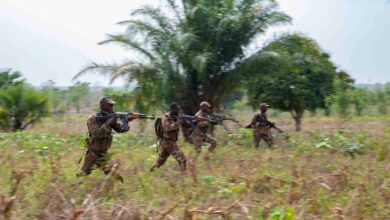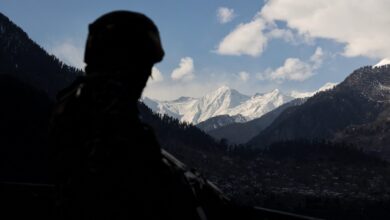Suicide Bomber Kills Nine Soldiers in West Pakistan
Nine soldiers were killed in a restive western region of Pakistan on Thursday after a suicide bomber rammed his motorbike into their military convoy and detonated, the army and officials said.
Pakistan has witnessed a dramatic uptick in militancy since the Taliban returned to power in neighboring Afghanistan two years ago, with attacks spiking along border regions.
A “motorcycle borne suicide bomber exploded himself” in Pakistan’s Bannu district, 61 kilometers (38 miles) from the border, the army’s media wing said.
The rugged border region has long been a hive of militant activity, with hardline organizations such as Pakistan’s home-grown Taliban group, Tehreek–e-Taliban Pakistan (TTP), using the largely unpoliced border to evade detection and stage assaults.
“The suicide bomber was riding a motorcycle and he rammed his bike into a truck in a military convoy,” provincial minister Feroze Jamal Shah told AFP.
Pakistan’s army said a further five soldiers were injured in the attack near the town of Jani Khel, however Shah put the figure at 20.
Caretaker Prime Minister Anwaar-ul-Haq Kakar called the incident “a cowardly terrorist act.”
The TTP is the largest threat in the region and Islamabad has claimed its fighters are finding safe haven in Afghanistan.
In recent months the group has waged a campaign against security officials, including police officers.
In January, a TTP-linked suicide bomber blew himself up in a mosque inside a police compound in the northwestern city of Peshawar, killing more than 80 officers.
The Islamic State group has also been active in the country, claiming responsibility for a suicide bombing last month that killed at least 54 people, including 23 children, at a political party gathering.
Pakistan was once plagued by almost daily bombings, but a major military clearance operation in the former tribal areas starting in 2014 largely restored order.
The seven remote districts that border Afghanistan, of which Bannu is one, were later brought under the control of Pakistani authorities after the passage of legislation in 2018.
Analysts say militants in the former tribal areas have become emboldened since the return of Taliban authorities in Afghanistan.
Pakistan meanwhile is facing a worsening security situation, an economic downturn, and political turmoil with elections for a new government due in the coming months, but no date yet formally announced.












